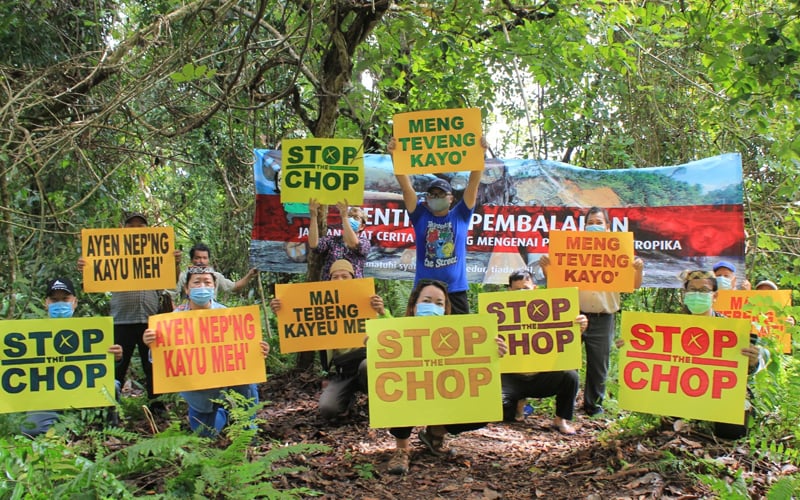FMT:
Logging in Ulu Baram no threat to indigenous communities, says rep
Telang Usan assemblyman Dennis Ngau says the people have benefited from the logging activities.

Activists demonstrating against logging in Ulu Baram in 2020 (SAVE Rivers pic)
PETALING JAYA: A Sarawak assemblyman has claimed that logging in Ulu Baram, a remote area in Miri, does not threaten the way of life for the indigenous communities.
Telang Usan assemblyman Dennis Ngau said the indigenous communities welcomed the logging as they had benefited from it.
Ulu Baram is home to 32 indigenous communities and about 4,000 people from the Kenyah, Kelabit, Saban and Penan communities.
Ngau, of Parti Pesaka Bumiputera Bersatu (PBB), said he had come to know of the communities’ stance after engaging with them.
He also said the Sarawak Forestry Corporation and the state forest department, which regulate the logging activities, had met with the communities to explain how they could benefit from them.
One benefit, he said, was employment opportunities.
“After engaging with these local communities, I realised they welcomed logging,” he told FMT.
On Feb 14, the Penan community set up a blockade to prevent logging from taking place in the Ba Abang village of Ulu Baram, demanding that the logging company stop “destroying our lands without consent”.
But Ngau downplayed the blockade, saying it was erected by a “very small group of people”.
“If we want development, we need to make concessions,” he said when asked to comment on the disputes between a section of the communities and the logging companies.
He also said it used to take him three or four days to travel from Miri to Ulu Baram, but now it only took him six hours. “The logging companies have built roads,” he said.
SAVE Rivers, an NGO that focuses on empowering rural communities to protect their ancestral land and rivers, said logging usually took place on sites where the indigenous communities had been residing for generations.
Its managing director, Celine Lim, said ancestral burial grounds were also situated there.
Lim said many indigenous communities were unaware that their land fell within the concession areas where logging was taking place, as they were not consulted.
“At the meetings held between the logging companies and the heads of villages, the heads are encouraged to sign documents they may not understand.
“They are briefly shown a map of the Ulu Baram area but not given a copy to bring home, meaning they aren’t made to understand where the boundaries are and the status of the land.”
Lim also said there was a misconception that indigenous communities did not want their land to be developed.
“This is wrong. We want development but we want to be consulted and included in the discourse,” she said.
PETALING JAYA: A Sarawak assemblyman has claimed that logging in Ulu Baram, a remote area in Miri, does not threaten the way of life for the indigenous communities.
Telang Usan assemblyman Dennis Ngau said the indigenous communities welcomed the logging as they had benefited from it.
Ulu Baram is home to 32 indigenous communities and about 4,000 people from the Kenyah, Kelabit, Saban and Penan communities.
Ngau, of Parti Pesaka Bumiputera Bersatu (PBB), said he had come to know of the communities’ stance after engaging with them.
He also said the Sarawak Forestry Corporation and the state forest department, which regulate the logging activities, had met with the communities to explain how they could benefit from them.
One benefit, he said, was employment opportunities.
“After engaging with these local communities, I realised they welcomed logging,” he told FMT.
On Feb 14, the Penan community set up a blockade to prevent logging from taking place in the Ba Abang village of Ulu Baram, demanding that the logging company stop “destroying our lands without consent”.
But Ngau downplayed the blockade, saying it was erected by a “very small group of people”.
“If we want development, we need to make concessions,” he said when asked to comment on the disputes between a section of the communities and the logging companies.
He also said it used to take him three or four days to travel from Miri to Ulu Baram, but now it only took him six hours. “The logging companies have built roads,” he said.
SAVE Rivers, an NGO that focuses on empowering rural communities to protect their ancestral land and rivers, said logging usually took place on sites where the indigenous communities had been residing for generations.
Its managing director, Celine Lim, said ancestral burial grounds were also situated there.
Lim said many indigenous communities were unaware that their land fell within the concession areas where logging was taking place, as they were not consulted.
“At the meetings held between the logging companies and the heads of villages, the heads are encouraged to sign documents they may not understand.
“They are briefly shown a map of the Ulu Baram area but not given a copy to bring home, meaning they aren’t made to understand where the boundaries are and the status of the land.”
Lim also said there was a misconception that indigenous communities did not want their land to be developed.
“This is wrong. We want development but we want to be consulted and included in the discourse,” she said.
No comments:
Post a Comment